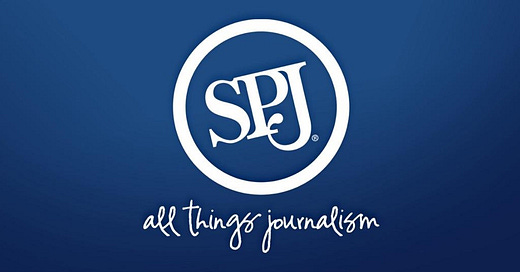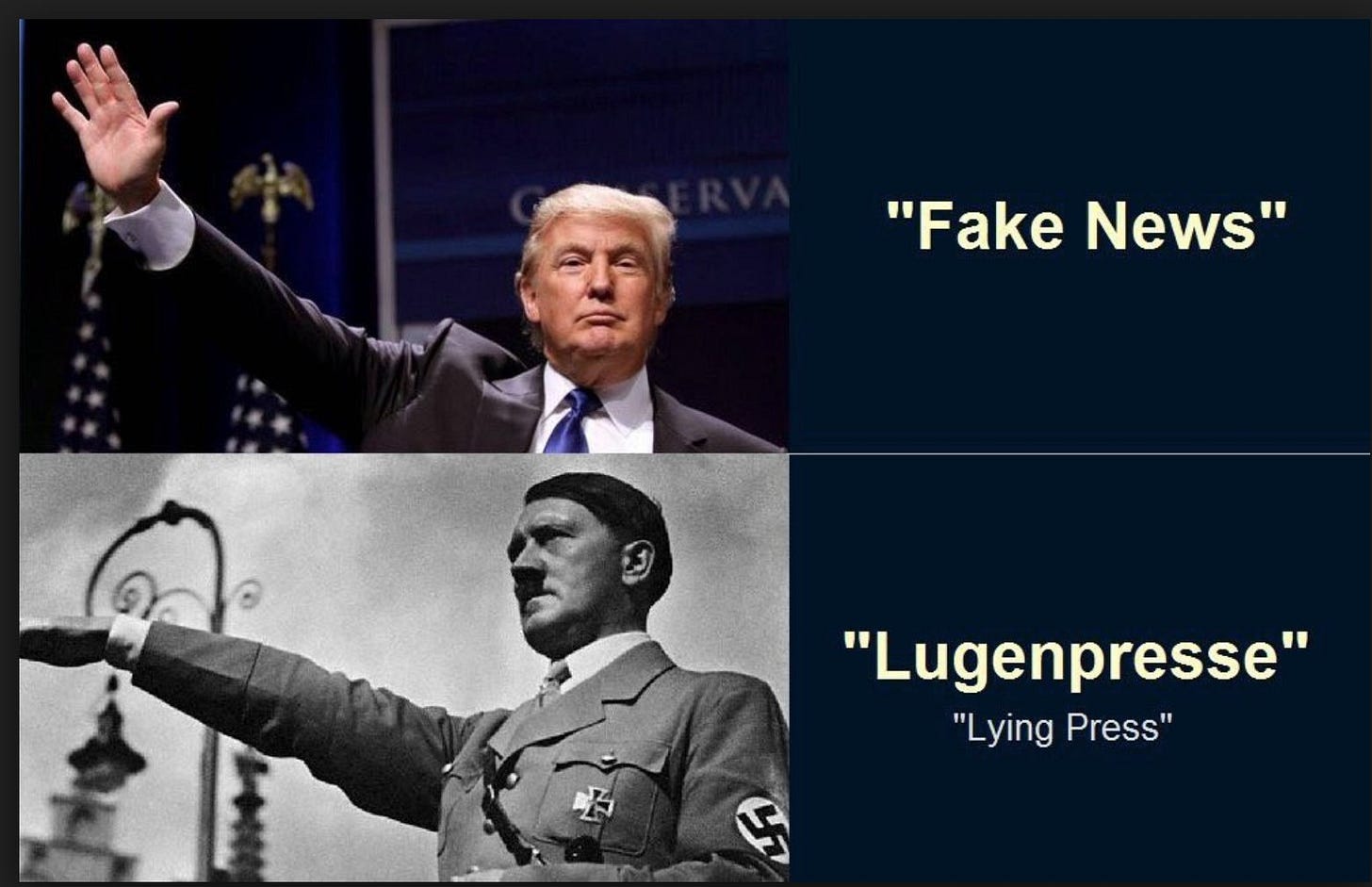Pssst. They're not listening to your criticisms. Pass it on.
Then take a pass on most of the “free press,” which is bought and paid for
In my undergraduate years at Mississippi State University, I served in several positions on the student newspaper, The Reflector - yes, the one Turner Catledge worked on (MSU ’22) and later was “best known for his work on the NY Times”.1 In routine form, I had worked my way up from lowly reporter to Sports Editor, and then to Managing Editor, but in my senior year was stopped cold at my application for Editor. No, I was not even granted an interview. Well, truth told, my resume revealed that lo and behold I wasn't a journalism major, though I could still sling that AP style around the room like no one’s business. To wit, I will always and forever use only one space after a sentence.
Yes, I loved journalism, but I was a Biochemistry major and had been heading, uninformed, to medical school since 5th grade. While my high school friends earned minimum wage making French fries, I earned great cash typing for a newspaper during the summers, though my point here is that I've known some journalists over the years who I still hold in high esteem. And a few too many of the other kind, go figure.
Those experiences have helped me understand that most journalists are not professionals like many of us grew up to believe, and many people still refer to them as such. I’m here to body slam that myth. If you do fall for that guise, ask yourself when was the last time you ever questioned that might not be true? And when was the last time you heard/read anyone suggesting they might not be? You’re probably reading that single instance right now. Trust me, they sure won’t bring up. Won’t I just leave that comforting impression alone? Keep reading and find out.
So, what does it require to be a journalist today? Maybe a laptop, if that. No required degree, no required education at all, no required training. While there’s a need to be able to write and/or speak, there’s likely no requirement to type. No required proficiency testing. No accreditation. No licensing. No governing board. No continuing education requirements. No consequences for malfeasance. All the things associated with the term "professional."
“Historically, the essential characteristics of the learned professions (education, clergy, law, health care) are self-regulation, a specialized body of knowledge, standards of education and practice, a fiduciary relationship with those served, and the provision of a particular service to society”.2
Cosmetologists/Barbers have these things.3 A cosmetologist/barber is a professional. A journalist, is not. Therein lies the greatest problem with the American democracy experiment and the free press — free to do whatever they wish, whenever they wish it.
It is commonly understood that doctors and lawyers, pilots and engineers, also have the characteristics and values of a professional. Sure, we all bitch and moan about these values, but we also recognize that without them one of our peers could hurt someone, or worse.
Can journalists actually hurt someone? Is journalism victimless? Your thoughts might leap to libel, ok, sure, but take a step back (especially if you are, or were, a journalist). What about not reporting the truth? What about selectively reporting the truth? Can either of those hurt someone? Do journalists have a code of ethics? Yes, only less strongly enforced than the US Supreme Court's code of ethics. Yes, I just wrote that.
In ethics, such conduct is referred to as Role Fidelity.4 You have a right to expect your dentist, your aesthetician, your architect to act a certain way, and they have a duty to fulfill that expectation. We should be able to expect veracity from journalists. We also expect our Supreme Court justices to act a certain way. They both have a duty to fulfill those expectations. Past the noun, the adjective you’re hunting for is also “professional.” Yes, we expect them to act professionally.
Do journalists have a duty? In 2024, apparently not. As one job hunting site describes the role of the journalist, “Journalists write and assemble news stories that will interest their audience.” Now imagine if teachers/professors just assembled lesson plans that interested their audience. I’ll wait.
Exactly.
If your friend gives you medical advice, that’s totally legit, right? If it’s interesting to you. Dr. Google, same. Dr. Facebook, of course. The physician? That all depends. You know we’re not necessarily keen on telling you what you want to hear. We suggest many things you tell us you “don’t want.” And who hasn’t heard about Aunt Sally’s niece’s boyfriend’s brother-in-law who had that thing they cured with the government-hidden remedy discovered on Facebook sometime back, for only $19.95, which the doctor never even had the cojones to mention? It turns out that the plural of anecdote has never been evidence.
The anti-intellectualism tenet of fascism has been particularly long in the making, and journalists were there for it, if they weren’t instrumental in bringing it about. You know what makes a great story? That doctor who misdiagnosed that ailment. The pilot who crashed a plane. As a journalism professor friend once reminded me, you know what doesn’t make a great story? All those doctors who did. All those pilots who didn’t. That freshman Senator who just breathily lied her ass off on national TV, while fake smiling. 5
You know what else sells? Hope, I mean hype -- definitely not proof. Just ask the NY Times. In one of their more infamous journalistic misadventures, “Hope in the Lab,” which began with “Within a year, if all goes well, the first cancer patient will be injected with two new drugs that can eradicate any type of cancer, with no obvious side effects and no drug resistance…” but very few read, or understood “if all goes well” or the next two words, “in mice”.6
I and oncologists across the nation remember the clinic phones ringing off the hook, for weeks, by desperate cancer patients and their families set up for a spectacular failure that journalists never had to deal with.7 Those drugs never cured some or even most cancers -- let alone all cancers, nor did they even make their way into clinical practice as a palliative treatment. Sure, this NY Times story was great for investors, but absolutely unethical for patients and their families. People were hurt greatly, emotionally, and physically by waiting or putting off current proven therapies.
That was 1998, and they’re still digging the hole.
And of course, fear also sells. Just ask the NY Times, again: “Fearing Drugs’ Rare Side Effects, Millions Take Their Chances With Osteoporosis”.8 I’m still amazed that as a lowly community oncologist, I had the opportunity, or at least I had thought, of providing valuable insight into those drugs to the curious author, as those drugs were all borrowed from Oncology. I forget even how that opportunity happened. As she and I began the discussion, we oncologists already knew a lot about these drugs and their side effects for many years previous, but that was cancer care.
We knew their side effects were not random, and what’s worse than fear for an adverse reaction you cannot predict, you know, like someone flying planes into buildings? Hey, but this was 2016 and even journalistic terrorism had become de rigueur. I remember reading the published article with excitement, only to find nothing mentioned about the significantly increased risks of those osteoporosis drugs associated with smokers. I called up the reporter and asked what happened to that important piece we had specifically discussed. “Oh,” she said, “It was a long story. That part must be on the cutting room floor.” Oh. Non-scientists with lots of ink and paper, promoting half-baked authority on science. Where’s the harm if you never know the people harmed?
Not a 2024 day goes by without patients still making indirect references to those exaggerated rare side effects, and what’s worse, many providers remain under the same impressions.
1st Amendment: Congress shall make no law ... abridging the freedom of speech, or of the press;
So, you could argue that licensing journalists is out. The Constitution is however silent on the ability of journalists forming professional societies of their own which require their voluntary members to demonstrate a certain level of education, proficiency, certification/accreditation, governance, and consequences for lack of integrity. Journalists could do that, if they wanted to, or more accurately put, if they saw the value in it.
Imagine reading a news article by an accredited journalist, vs. a news article written by a hack. Is that an improvement in role fidelity? I’ll argue strongly in favor. Maybe.
Say, did you know, that for a mere $500, you too can become a member of the Society of Professional Journalists?9 Well, you’d only be a Bronze member. Silver will cost you $950, and Gold will cost you $1800. Up to the point of paying for the privilege of meaning nothing, I did not have to provide any credentials. It turns out that a credit card is the only credential you need to belong to SPJ. At least my “bronze” Blue Shield health insurance policy meant something. (It meant I was insured, poor, and screwed.)
“You are joining the nation’s strongest and longest-serving journalism organization. We are ready to be there for your professional and personal success. With your membership comes one of the most respected professional reputations in the world of media. Please add the Society of Professional Journalists to your resume, your Twitter and LinkedIn profiles, and your email signature. You are now united with those who truly love and respect the critical role of journalism in our society. Your membership comes with increased knowledge of what’s happening in journalism and exclusive educational opportunities. Be sure your profile on www.spj.org is always up-to-date and stay tuned for opportunities to attend events sponsored by SPJ. Look for Leads, SPJ’s weekly newsletter, in your inbox each Wednesday. And watch your mailbox for our quarterly magazine, Quill. Thanks again for being the best part of SPJ.”
More like “longest self-serving journalism organization.” No, I did not add prostitution to my cart, and I don’t recommend anyone else does either. Pro Tip: Organizations only have power because we give it to them.
Perhaps the most delicious irony over the past several years are conseratives’ resurrection of the term Lügenpresse,10 and American journalists’ race to the bottom to prove them right, like it was some kind of directive instead of the obvious insult intended.
But you say, don’t we also sometimes use the word “professional” in a mocking sense? Absolutely. “He’s a professional liar.” “She’s a professional tool.” “They are professional scammers.” Do not fret; I will forever defend your right to refer to journalist hacks in this manner.
So, consider the source, and I do mean every willfully ignorant, intellectually lazy journalist you may have the displeasure to encounter. They will have brought their own, and our, destruction.
Primum non nocere.11
It’s not just for healthcare any more.
https://www.barbercosmo.ca.gov






